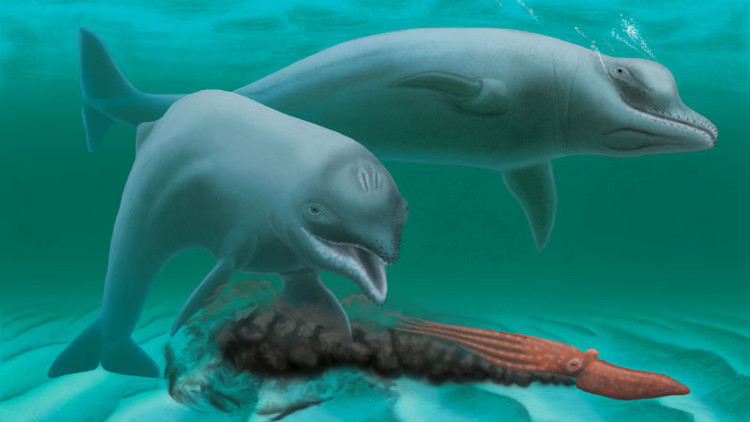The mystery of the toothless 'mini' dolphin lived 30 million years ago
The group of American scientists recently revealed a small toothless dolphin that once inhabited many oceans around the world 30 million years ago.
According to an article published by the Royal Academy of Sciences in the Proceedings B magazine on August 23, a study of just one fossil skull was found in a river near the city of Charleston, Carolina, South America. , University of Charleston scientists recreated evolution as well as sketched out the face and shape of this upturned nose-nosed mammal.
At over 1 meter in length from the muzzle to the tail, the "mini" dolphin called Inermorostrum xenops (I. xenops) is about half the size of other common dolphins. This is one of the two main groups of mammals called Odontoceti. This group has an outstanding ability in echolocation by developing radar-like capabilities to locate and detect targets.

Short nose is the characteristic evolutionary point of this species in particular and Odontoceti species in general.
The I. xenops species took about 4 million years to evolve from ancestral whales with new features in the oral cavity when there are no roots and become "expert" smoking food.
During this time, I. xenops lost its pearl-white skin, the muzzle shrunk, while the lips became "super" thick. The short nose is the characteristic evolutionary point of this species in particular and the Odontoceti species in general is capable of smoking skilled food, in which the aperture of the mouth is smaller, the greater the attraction of food.
The prey of I. xenops is mainly small fish, squid and other mollusks. Due to the tendency to snout, the researchers believe that the hunting range of this species is mainly in the ocean floor.
Meanwhile, in the Oligocene World , a geological posture 25-35 million years ago, other echoing mammals evolved with long snout and teeth to adapt to hunting. bigger fish.
Research by the American team also showed that both long and short snout species evolved many times, suggesting that natural selection is not a random process.
- The world was once dominated by a toothless giant
- Albino dolphins cost half a million dollars captured in Japan
- Changjiang River dolphin returned after a missing decade in China
- Aquaculture dolphin and whale teeth
- Dolphins call each other by whistling
- Video: Rare albino dolphin in America
- Video: A rare sight of dolphins giving birth
- China created mini genetically modified pigs, priced at 36 million / head
- Found the ancient elephant remains that lived 3 million years ago
- Pink dolphin in Japan
- Translated dolphin language
- Discover extinct fish lizards 25 years ago
 Discovered an ancient centipede fossil 99 million years old
Discovered an ancient centipede fossil 99 million years old Discovered bat-like dinosaurs in China
Discovered bat-like dinosaurs in China Discovered a 200-year-old bronze cannon of the coast
Discovered a 200-year-old bronze cannon of the coast Discover 305 million-year-old spider fossils
Discover 305 million-year-old spider fossils